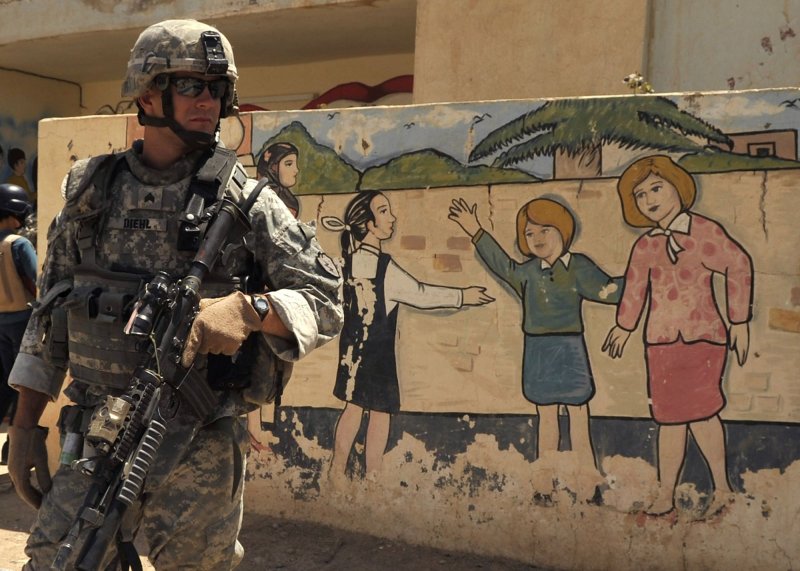U.S. Army Sgt. David Diehl, of Alpha Company, 1st Battalion, 21st Infantry Regiment, provides security outside a school in Baqubah, Iraq, July 19, 2010. U.S. and Iraqi forces worked together to provide aid to schools and other organizations throughout the Diyala province of Iraq. UPI/Ted Green/US Navy |
License Photo
BAGHDAD, Dec. 1 (UPI) -- Iraq's U.S.-trained military and security forces seem to be coping with insurgent violence amid the U.S. withdrawal, but there are growing fears they remain dangerously fragmented along sectarian lines and prey to a bitter political power struggle.
There have even been suggestions that the country is now witnessing the "classic conditions for a military coup."
Another danger, says the Saudi-owned Asharq al-Awsat newspaper, is that pro-Iranian Shiite militias overthrow the Baghdad government if the current prime minister, Nouri al-Maliki, a Shiite linked to Tehran since the 1979 Iranian Revolution, "is not able to remain as prime minister."
That seems a long shot right now, as Maliki struggles to form a coalition government that includes his rivals after nine months of crippling political deadlock that resulted from an inconclusive parliamentary election in March.
But Iraq has a long history of coups since the modern state emerged after World War I and the demise of the Ottomans. The first was in 1936, when Iraq was under British rule and marked the first time Iraq's military entered the political arena.
In July 1958, the pro-British Hashemite monarchy of King Faisal II was toppled by Gen. Abdel Karim Qasim. He ruled until 1963 when the Baath Party briefly took power.
Several more coups followed until the Baathists established control, and under Saddam Hussein, who took over as president in 1979, the military became one of the most powerful in the Middle East and the backbone of the Sunni-dominated Baathist regime.
Asharq al-Awsat, which supports Iraq's disempowered Sunni minority, quoted a senior but unidentified Iraqi official as saying recently while the power struggle between Maliki and his rivals raged that "the chaotic political and security situation … could give senior officers in the army the justification to carry out a coup."
Even though the political situation has stabilized somewhat since the feuding parties agreed in November that Maliki should form a new government, the crisis is far from over.
The country could once again be plunged into turmoil -- with U.S. forces on hand to restore some semblance of order.
In such an eventuality, Sunni-led Arab states such as Saudi Arabia and Egypt could escalate their efforts to thwart Iraq becoming a Shiite state dominated by Shiite-majority Iran and further destabilize the country by aiding military factions.
"Many believe the current political impasse in Iraq is due to a regional power struggle over control of the country," observed Hamid Alkifaey, the first government spokesman in post-Saddam Iraq currently with the University of Exeter in Britain.
"Iran wishes to see a Shiite Islamic government in Baghdad that is in line with its political thinking.
"Under the current circumstances, such a government can only be led by the incumbent Maliki, who wields more power with Shiite circles than any other Islamic leader," Alkifaey observed.
"While this option may be acceptable to Iran's main regional ally, Syria, it is anathema to the Arab order in general, which favors an Arab-leaning secular government led by Iyad Allawi," a secular Shiite and former CIA asset who is Maliki's main rival.
These concerns were underlined by a recent Rand Corp. report on the U.S. military withdrawal that noted "there is a risk Iraq's political and military leaders could be emboldened by the departure of U.S. forces and their own growing strength to seize power."
U.S. plans to sell Iraq advanced weapons systems, including F-16 fighter jets, laser-guided bombs and Sidewinder air-to-air missiles worth $4.2 billion, have caused concern because of the firepower they will give Iraq's fractious military, whose reliability is in question.
The proposed sale has alarmed Iraq's neighbors, who saw Saddam turn on Iran and Kuwait in 1980 and 1990, since that comes on top of Baghdad's purchase of new weapons worth $5 billion since 2006.
Since he was elected premier in 2008, Maliki has asserted wide-ranging personal control over military and security forces outside of parliamentary oversight.
The U.S. exit strategy called for building up Iraqi forces to maintain order. Right now some 80 percent of these are Shiite, which minority Kurds and Sunnis see as a threat.
Until a "representative and responsible government" has been installed in Baghdad," says British analyst James Denselow of King's College, London, "the arming of Iraq's military should be put on hold."





